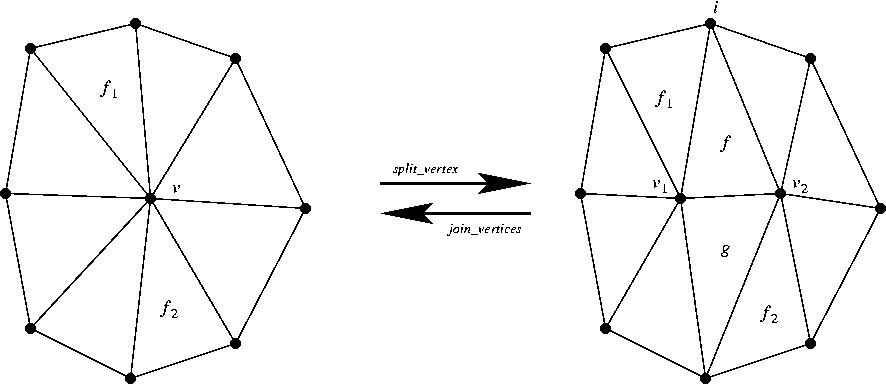|
CGAL 5.0.4 - 2D Segment Delaunay Graphs
|
|
CGAL 5.0.4 - 2D Segment Delaunay Graphs
|
The concept SegmentDelaunayGraphDataStructure_2 refines the concept ApolloniusGraphDataStructure_2. In addition it provides two methods for the merging of two vertices joined by an edge of the data structure, and the splitting of a vertex into two. The method that merges two vertices, called join_vertices() identifies the two vertices and deletes their common two faces. The method that splits a vertex, called split_vertex() introduces a new vertex that shares an edge and two faces with the old vertex (see figure below). Notice that the join_vertices() and split_vertex() operations are complementary, in the sense that one reverses the action of the other.

v is split into \( v_1\) and \( v_2\). The faces \( f\) and \( g\) are inserted after \( f_1\) and \( f_2\), respectively, in the counter-clockwise sense. The vertices \( v_1\), \( v_2\) and the faces \( f\) and \( g\) are returned as a boost::tuple in that order. Right to left: The edge (f,i) is collapsed, and thus the vertices \( v_1\) and \( v_2\) are joined. The vertex v is returned. We only describe the additional requirements with respect to the ApolloniusGraphDataStructure_2 concept.
Modification | |
| Vertex_handle | join_vertices (Face_handle f, int i) |
Joins the vertices that are endpoints of the edge (f,i) and returns a vertex handle to common vertex. | |
| boost::tuples::tuple< Vertex_handle, Vertex_handle, Face_handle, Face_handle > | split_vertex (Vertex_handle v, Face_handle f1, Face_handle f2) |
Splits the vertex v into two vertices v1 and v2. More... | |
| boost::tuples::tuple<Vertex_handle, Vertex_handle, Face_handle,Face_handle> SegmentDelaunayGraphDataStructure_2::split_vertex | ( | Vertex_handle | v, |
| Face_handle | f1, | ||
| Face_handle | f2 | ||
| ) |
Splits the vertex v into two vertices v1 and v2.
The common faces f and g of v1 and v2 are created after (in the counter-clockwise sense) the faces f1 and f2. The 4-tuple (v1,v2,f,g) is returned (see Figure 50.1).